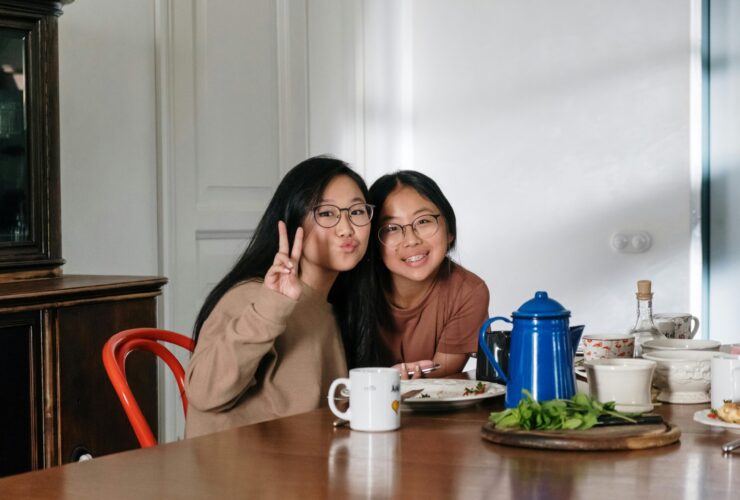
Defining the Eldest Daughter Experience
When we talk about the eldest daughter, we usually mean the first-born girl. But often, the realities are more complex. The mantle of “eldest-ness” may shift (or be placed on someone) not always by birth, but by burden, by culture, by necessity.
- Perhaps the first-born daughter left home.
- Perhaps she stepped away, consciously or unconsciously, from that role.
- Perhaps all daughters in your family were parentified, and responsibilities were distributed in different ways.
This broader understanding matches what recent qualitative research is finding – that eldest-daughter identity isn’t always tied directly to being first-born. It’s about who was asked, often from childhood, to carry care, to hold places and spaces for others. A recent MA thesis, “The Parentification of Eldest Daughters” (2024) by Isabella Loraina Ciarico, explores precisely this: how eldest daughters perceive their identity when parentification has been part of their story. (Source: USD RED)
So, whether you are eldest by birth or eldest by circumstance, this is your space. This is your name. This conversation is for you.
The Weight of Expectation: Understanding the Eldest Daughter Archetype
Eldest Daughters may face patterns of pressure, responsibility, expectations – most of which aren’t always visible, but run deep.
Here are some of the patterns researchers, therapists, and lived stories are uncovering:
| Pattern | Description | Research/Source |
| Heightened responsibility | Often assuming care for younger siblings; stepping into roles around the home early. | Ciarico’s work shows eldest daughters with parentification carrying caregiving tasks from childhood. (USD RED) |
| Perfectionism / High Expectations | Feeling you need to be the “good example,” reproducing high internal standards. | Psychology Today notes this as a common way EDS shows up. (Psychology Today) |
| Parentification | Emotional parentification (being the confidant or mediator) and instrumental parentification (household work, managing logistics). | Cleveland Clinic’s article on “What is Parentification?” distinguishes these forms and their long-term effects. (Cleveland Clinic) |
| Difficulty setting boundaries | Saying “yes” when you want to say “no”; feeling it’s disloyal or selfish to ask for rest. | VerywellMind writes that boundary issues often reflect early learned dynamics in families. (Verywell Mind) |
| Emotional suppression / People-pleasing | Minimizing anger or sadness to avoid conflict; prioritizing others over self. | Articles on EDS highlight emotional labor and suppression as central burdens. (Charlie Health) |
| Resentment & guilt | Resenting unmet or unappreciated efforts; feeling guilt for wishing things were different. | The Guardian on “eldest daughter syndrome” emphasizes this tension between responsibility and desire. (The Guardian) |
| Challenges in adult relationships / identity loss | Difficulty receiving care; confusion about self vs. caretaker; burnout. | The dissertation by Ciarico, and articles from Cleveland Clinic and VerywellMind, report adult descendants of this burden struggle in relational reciprocity and sense of self. (USD RED) |
One clarifying point: “eldest daughter syndrome” is not a clinical diagnosis. It’s a framework, a way to understand real, often under-seen burdens. (Northeastern Global News)
Life Application: Some Questions for Deeper Reflection

This isn’t just theory – it’s your life. Consider these questions as invitations to explore your experiences:
- What messages, both spoken and unspoken, did you receive growing up about being “the good daughter,” the responsible one, or the caregiver?
- When did you first become aware of carrying more than your fair share of burdens?
- Can you trace a timeline of your life, noting moments when you should have been a child but were instead expected to take on adult responsibilities?
- What cultural, familial, and work values reinforced the patterns you adopted?
These questions are not meant to induce guilt, but to help you see and name your experiences. By doing so, you can begin to consciously choose what you will continue to carry and what you are ready to release.
A Long-View Path to Healing
You’ve carried this load with admirable strength. But strength doesn’t require sacrifice of self. What might it look like to begin to heal, to let some of those expectations rest?
Research and wisdom offer practices for eldest daughters:
- Name it, witness it. Acknowledging the experience brings relief and reduces isolation. (source: The Guardian)
- Set small boundaries. Start by saying no to minor responsibilities; discomfort often signals growth.
- Seek support. Therapy, friends, or mentors can help identify internalized expectations.
- Reclaim parts of yourself. Re-engage with past hobbies, beliefs, and dreams before becoming “the helper.”
- Rest isn’t optional. True rest resists the narrative that your value lies in constant doing; emotional, spiritual, and physical rest are crucial.
Links and Resources:
Follow Yellow Chair
- Entwine Community: https://entwinecommunity.org/
- Yellow Chair Collective: https://yellowchaircollective.com/
- IG: https://www.instagram.com/yellowchaircollective/?hl=en
- TikTok: https://www.tiktok.com/@yellowchaircollective
Relevant Resources
Yellow Chair Collective Podcast:
- ELDEST DAUGHTER TALK – Does Being an Eldest Daughter Mean Becoming a Second Mom? Yoo Jin Kang Part 1
- ELDEST DAUGHTERS TALK – On Emotional Labor with Eldest Daughters Collective
- ELDEST DAUGHTERS TALK – Breaking The Silence About Postpartum Mental Health | AUDIO ONLY
- ELDEST DAUGHTERS TALK – Israa Nassir EXPOSES the Secrets that Lead to Toxic Productivity!
- ELDEST DAUGHTER TALK – Are Asian People Really As Quiet As Everyone Thinks? | John Wang
Seek An Individual Therapist at Yellow Chair Collective in Los Angeles or New York
If you are seeking therapy specifically tailored to your needs, consider reaching out to the therapists at Yellow Chair Collective. We understand that there may be unique contextual factors that may influence your experiences.
At our Los Angeles, CA, and New York City, NY-based therapy practice, we have many skilled, trauma-informed, and culturally sensitive therapists who can provide an empowering therapeutic experience. For your added convenience and simplicity, we offer online therapy for anyone in the state of California or New York. We know that navigating life as an eldest daughter can be challenging, and we want to support you on your journey. Follow the steps below to begin.
- Fill out the contact form to get connected with us.
- Get matched with one of our culturally sensitive therapists.
- Start the next step in your healing journey today.
Other Services at Yellow Chair Collective
There are many options for treatment using online therapy in California and New York, it just depends on what you’re needing. And while we certainly service Asian American folks, we also work with individuals from other cultures, too. So, whether you’re needing support in overcoming anxiety, burnout, trauma, or PTSD, we can help. Likewise, we serve teens and couples in need of support, too. So when you start online therapy with us, you can bring your whole self, including past struggles, cultural impacts, and more.






